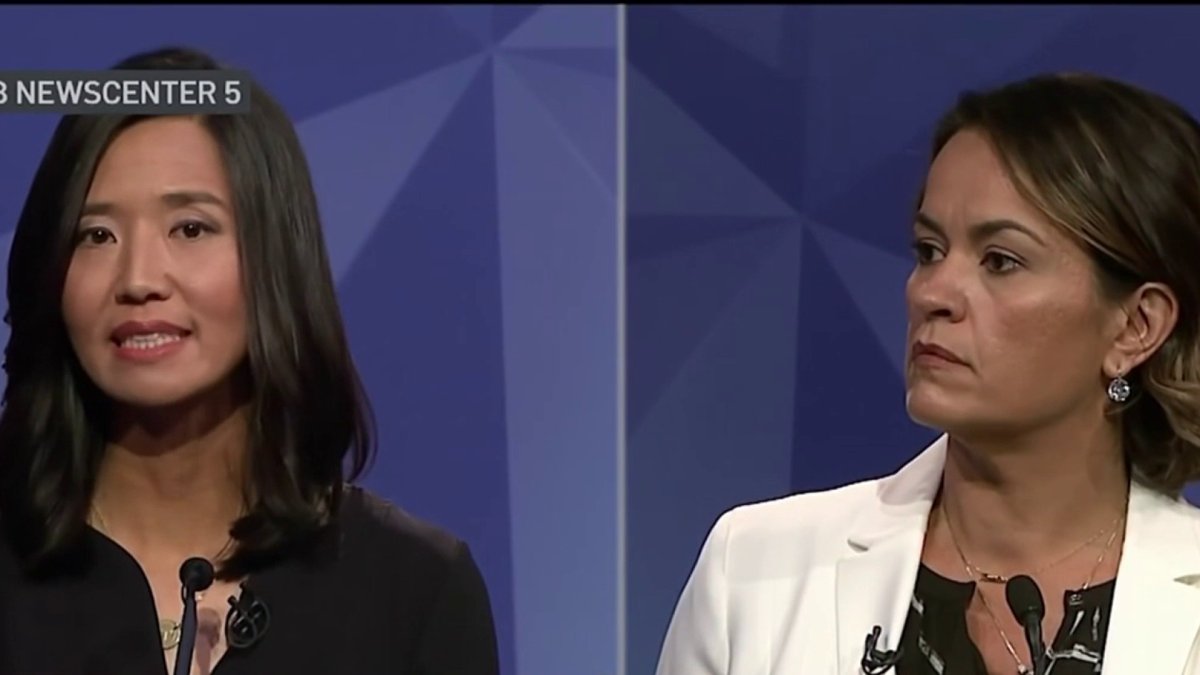
The topic of Mass. and Cass surrounding addiction and homelessness created the most sparks Monday night as Michelle Wu and Annissa Essaibi George faced off in their final debate..
Boston mayoral hopefuls Michelle Wu and Annissa Essaibi George faced off Monday night in the final debate of a campaign that will for the first time end with a woman and person of color being elected to the top political office in the city.
The debate began at 7 p.m. and could have given Essaibi George her last best chance to appeal to voters who have yet to make up their mind. The pressure was on Essaibi George during the hour-long debate, with recent polls showing Wu leading the race and Essaibi George down as much as 30 points.
Essaibi George called out Wu for her plan “…to abolish the Boston Planning and Development Agency, to stop development and growth and opportunity.”
Wu shot back, “It’s a misunderstanding of the plan that I’ve laid out.”
Get Boston local news, weather forecasts, lifestyle and entertainment stories to your inbox. Sign up for NBC Boston’s newsletters.
Essaibi George responded, “There is no misunderstanding of the term abolish.”
Asked if they backed Mayor Kim Janey’s halting of waterfront development over concerns of extreme weather, Essaibi George said, “To tweak it on the edges might be fine. But to toss it out the window all together is unfair to the work that was done.”
Wu said she did support Janey‘s plan, adding, “Those years and years of meetings and process did not adequately capture residents' participation and it certainly did not end up with a plan that reflected the dire crisis of climate that faces us.”
But it was the topic of Mass. and Cass surrounding addiction and homelessness that created the most sparks Monday night.
Essaibi George said, “I’ve got a message first for Michelle. Because she’s been stuck in conversation, she doesn’t truly understand the crisis that is Mass. and Cass.”
She pledged to rebuild the Long Island bridge and restore recovery services. saying, “We’ve got to move quickly on this, Michele. We have to move quickly.”
Wu responded, “The bridge and the price tag of doing so means that we would be giving up and diverting our resources away and moving from urgent action. I’m not willing to wait.”
Essaibi George said, “These conversations are taking much too long for the men and women who are on the street tonight. For the women who will be raped tonight… We cannot wait for conversations. We’ve got to act.”
Wu countered, “I’m not exactly sure which conversation my colleague is referring to. But every time that I go into a conversation or meeting I leave with action steps.”
Wu will be happy if she has held the line, while Essaibi George is hoping she has attracted new support and rallied her base to get out and vote.
Monday's debate will be followed Tuesday by one-on-one conversations with both candidates that will air from 7 to 8 p.m. on NBC10 Boston in partnership with King Boston and the Black Economic Council of Massachusetts.
Bostonians have already begun casting their ballots at early voting locations across the city. Early voting runs through Friday. Election Day is Tuesday, Nov. 2.
September's preliminary election became a race for second place, after Wu ran away with first place by an 11-point margin. But only a quarter of Boston's 432,097 registered voters voted in that round, so both candidates have a clear shot at winning in November.
The contest will make history with the winner — whether Wu, 36, or Essaibi George, 47 — becoming the first woman and first person of color to be elected mayor.
Wu, whose parents immigrated to the U.S. from Taiwan, grew up in Chicago and moved to Boston to attend Harvard University and Harvard Law School. Essaibi George, 47, a lifelong Boston resident, describes herself as a first-generation Arab-Polish American.
Boston has only elected white men as mayor. Wu and Essaibi George are both Democrats.
Essaibi George and Wu agree that the city is facing many challenges — from public schools and policing to managing the pandemic and coping with soaring housing costs — but differ on how they would tackle the problems.
The two have been spending the final days of the campaign racing across the city to speak to undecided voters and encourage their supporters to get to the polls.
On Saturday, both candidates spoke at a Town Hall forum at the Morning Star Baptist Church in the city's Mattapan neighborhood.
The city's previous elected mayor — Democrat Marty Walsh — stepped down to become U.S. Secretary of Labor under President Joe Biden.
He was replaced on an acting basis by Kim Janey, who was sworn in March 24 as Boston's first female and first Black mayor. Janey ran for mayor — but failed to be one of the two top vote-getters during last month's preliminary election.